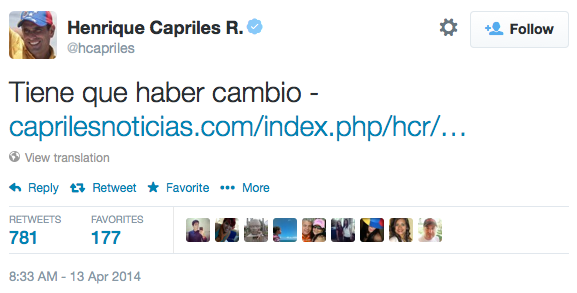EspañolNicolás Maduro rejected the measures proposed by the opposition during negotiations last week, and yesterday he called on the citizens of Venezuela to renew their faith in the socialist revolution. He spoke from the Miraflores Palace before the Bolivarian National Militia, after commemorating 12 years since the return to power of Hugo Chávez.
In an interview published by the newspaper Ultimas Noticias, Maduro said it would be a major step toward the advancement of democracy if “the Venezuelan opposition arrived at the conclusion that it should respect the constitution, Chavismo, and its political project as the majority.”
During the same interview, Maduro insisted that a true democratic opposition should arise in the country, independent of the United States, and one that respects the rules of democracy.
With regard to the ongoing talks, he stated that “everything else that follows from there is benefits that can be achieved from the point of view of governance” and that “as long as the opposition acts within the bounds of the Constitution, I think things will go better for them and for the country.”
When asked about the mutual concessions needed to continue the dialogue, the Venezuelan president repeated his hope that opposition leaders would “condemn violence as a political method to achieve power and as a method to express opposition.”
However, Henrique Capriles, lawyer and opposition governor of Miranda, wrote a statement yesterday regarding the impact of negotiating with Maduro and condemning the violence by paramilitary groups.
“Even in war, there are pauses for dialogue. There must be an opportunity for this in Venezuela today. Dialogue does not mean faltering on ideas, but to find a path to reach those who do not think like us. With only one goal: to eradicate violence and intolerance in the lives of Venezuelans forever, to create economic and social conditions that allow our people to move peacefully toward progress and the future,” Capriles declared.
Meanwhile, Bolivarian militias gathered yesterday outside the Miraflores Palace to listen to President Maduro — one year after he won the election that followed the death of Hugo Chávez. First vice president of the National Assembly Darío Vivas introduced Nicolás Maduro during the ceremony as the son of Hugo Chávez, and Maduro reminisced:
“Tomorrow we complete one year since the people’s heroic victory in the elections. In a year, this same oligarchy has launched a continuous and ongoing economic war, smuggling, inducing inflation, hoarding, economic sabotage, electronic and psychological war, and now guarimba. Fascist guarimbas [citizen resistance and barricades].”
Maduro argued that the only thing the government can do is “move toward an economic model that includes more people,” so that they can become “directly involved in the process of economic growth and development.” This must be done, he says, while always adhering to “the economic model as outlined by Commander Chávez, which is the most complete [model] applied in Venezuela in the last 100 years.”
The president urged Vladimir Padrino López, head of Strategic Operational Command, to consolidate the national militia, and asked that he keep “expanding and consolidating around the country, in every community, with a plan … to continue shaping their forces in every factory and in every workplace.”
Maduro explained that the militia is nothing more than the people in arms and it should act in accordance with the Organic Law of the Armed Forces. He concluded with a call to the country to renew its faith in the revolution.
“It is time for a permanent renewal of love and faith. I call on the people to renew their love, their faith, and their trust in the Bolivarian revolution and the socialist path,” said Maduro.
Capriles countered that the revolution is not working and explained in his statement that Venezuela suffers from a chronic food shortage problem.
“If there is one right that this government violates, it is the right to food. Today, going to the market in Venezuela is an odyssey. They mark the arms of Venezuelans, as if they were animals, and they are forced to wait in line for up to six hours to buy food. When they can find it, it costs four times more [than it should].… according to official numbers, food prices rose 75 percent in the last 12 months, and it is much worse in reality. The economic model that is outlined in the constitution does not look anything like the model that the government is applying throughout the country,” said the opposition leader.
A New International Public Relations Ministry
Following controversy surrounding allegations and accusations from the international press, Maduro hopes to take the revolution a step further and create a ministry devoted “exclusively to the global defense” of the country’s image.
“It is a great challenge for any country to face the communications war that has been launched against the country, the revolution, and in particular, against me as president,” said Maduro.
Out of the necessity of the times, Maduro argues, the ministry will need to control all information coming out of Venezuela.
Juan Carlos Hidalgo of the Cato Institute dismisses such an initiative as meaningless.
“Maduro has no need for a [such a ministry] when the message possesses blatant repression towards demonstrations, self-inflicted economic disaster, and persecution against the nation’s independent press.”
 Versión Español
Versión Español













